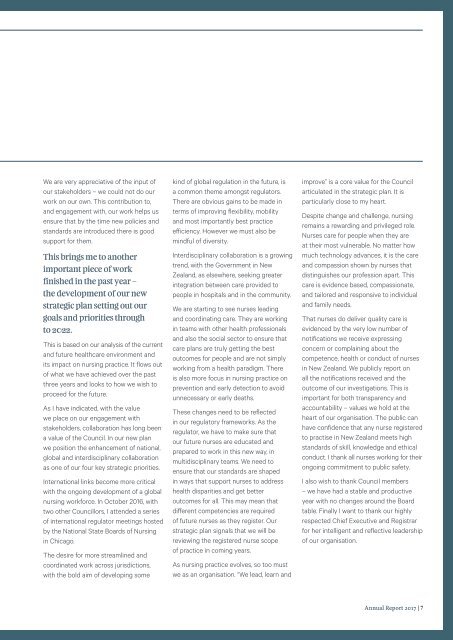NZNA_AnnualReport2017_280817_v10_small
Create successful ePaper yourself
Turn your PDF publications into a flip-book with our unique Google optimized e-Paper software.
We are very appreciative of the input of<br />
our stakeholders – we could not do our<br />
work on our own. This contribution to,<br />
and engagement with, our work helps us<br />
ensure that by the time new policies and<br />
standards are introduced there is good<br />
support for them.<br />
This brings me to another<br />
important piece of work<br />
finished in the past year –<br />
the development of our new<br />
strategic plan setting out our<br />
goals and priorities through<br />
to 2022.<br />
This is based on our analysis of the current<br />
and future healthcare environment and<br />
its impact on nursing practice. It flows out<br />
of what we have achieved over the past<br />
three years and looks to how we wish to<br />
proceed for the future.<br />
As I have indicated, with the value<br />
we place on our engagement with<br />
stakeholders, collaboration has long been<br />
a value of the Council. In our new plan<br />
we position the enhancement of national,<br />
global and interdisciplinary collaboration<br />
as one of our four key strategic priorities.<br />
International links become more critical<br />
with the ongoing development of a global<br />
nursing workforce. In October 2016, with<br />
two other Councillors, I attended a series<br />
of international regulator meetings hosted<br />
by the National State Boards of Nursing<br />
in Chicago.<br />
The desire for more streamlined and<br />
coordinated work across jurisdictions,<br />
with the bold aim of developing some<br />
kind of global regulation in the future, is<br />
a common theme amongst regulators.<br />
There are obvious gains to be made in<br />
terms of improving flexibility, mobility<br />
and most importantly best practice<br />
efficiency. However we must also be<br />
mindful of diversity.<br />
Interdisciplinary collaboration is a growing<br />
trend, with the Government in New<br />
Zealand, as elsewhere, seeking greater<br />
integration between care provided to<br />
people in hospitals and in the community.<br />
We are starting to see nurses leading<br />
and coordinating care. They are working<br />
in teams with other health professionals<br />
and also the social sector to ensure that<br />
care plans are truly getting the best<br />
outcomes for people and are not simply<br />
working from a health paradigm. There<br />
is also more focus in nursing practice on<br />
prevention and early detection to avoid<br />
unnecessary or early deaths.<br />
These changes need to be reflected<br />
in our regulatory frameworks. As the<br />
regulator, we have to make sure that<br />
our future nurses are educated and<br />
prepared to work in this new way, in<br />
multidisciplinary teams. We need to<br />
ensure that our standards are shaped<br />
in ways that support nurses to address<br />
health disparities and get better<br />
outcomes for all. This may mean that<br />
different competencies are required<br />
of future nurses as they register. Our<br />
strategic plan signals that we will be<br />
reviewing the registered nurse scope<br />
of practice in coming years.<br />
As nursing practice evolves, so too must<br />
we as an organisation. “We lead, learn and<br />
improve” is a core value for the Council<br />
articulated in the strategic plan. It is<br />
particularly close to my heart.<br />
Despite change and challenge, nursing<br />
remains a rewarding and privileged role.<br />
Nurses care for people when they are<br />
at their most vulnerable. No matter how<br />
much technology advances, it is the care<br />
and compassion shown by nurses that<br />
distinguishes our profession apart. This<br />
care is evidence based, compassionate,<br />
and tailored and responsive to individual<br />
and family needs.<br />
That nurses do deliver quality care is<br />
evidenced by the very low number of<br />
notifications we receive expressing<br />
concern or complaining about the<br />
competence, health or conduct of nurses<br />
in New Zealand. We publicly report on<br />
all the notifications received and the<br />
outcome of our investigations. This is<br />
important for both transparency and<br />
accountability – values we hold at the<br />
heart of our organisation. The public can<br />
have confidence that any nurse registered<br />
to practise in New Zealand meets high<br />
standards of skill, knowledge and ethical<br />
conduct. I thank all nurses working for their<br />
ongoing commitment to public safety.<br />
I also wish to thank Council members<br />
– we have had a stable and productive<br />
year with no changes around the Board<br />
table. Finally I want to thank our highly<br />
respected Chief Executive and Registrar<br />
for her intelligent and reflective leadership<br />
of our organisation.<br />
Annual Report 2017 | 7


